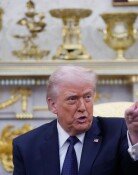Final U.S. Pres. Debate Ends With No Clear Winner
Final U.S. Pres. Debate Ends With No Clear Winner
Posted October. 17, 2008 06:55,
Republican candidate John McCain and Democratic rival Barack Obama held their final U.S. presidential debate at Hofstra University in Hempstead, New York, Wednesday night.
After the nationally televised debate ended, a Republican supporter gave a standing ovation and sighed, saying, Time is running out.
With 20 days remaining until Election Day, Obama and McCain held their most intense debate of their presidential campaigns. Neither a game changer nor a major blunder occurred, as the 90-miniute match-up ended in a draw.
After the debate, Democratic strategists hailed an Obama victory, calling him a marathoner running toward the finish line while keeping a steady distance with the runner-up.
Many experts say, however, that the race is far from over, as a raft of factors could sway the result. One wild card is the "Bradley effect, in which white voters say they will vote for a black candidate but then will not. Above all, McCain is likely to pull out all the stops to get momentum back to his side, living up to his reputation as the comeback kid.
As expected, McCain in the debate came out strong from the beginning and kept up an offensive against his rival. Though Obama was on the defensive throughout the 90-minute forum, he never lost his composure.
The Washington Post said McCain did better than in the two previous debates, but Obama also showed the temperance and judgment needed by a national leader.
When McCain attacked Obama for comments Obama never made, however, the Illinois senator often responded with a laugh.
Policy differences between the two candidates were conspicuous in the debate. Obama promised a 95-percent tax cut for all Americans and criticized McCains tax cut policy as benefiting companies only.
When Obama stressed the importance of spreading the wealth, McCain accused him of basing his plan on class warfare.
The real attention grabber, however, was the story of Joe Wurzelbacher, an Ohio plumber who criticized the Democrats tax plan to Obama on a campaign stop Sunday.
Joe wants to buy the business that he has been in for all of these years, worked 10-12 hours a day. You were going to put him in a higher tax bracket which was going to increase his taxes, which was going to cause him not to be able to employ people, McCain said.
As if the two candidates were talking to Wurzelbacher in person, they called Joe, who was looking at the camera.
The free trade agreement signed between Korea and the United Sates was another hotly debated issue.
Obama opposed the agreement, saying, They send hundreds of thousands of South Korean cars to the United States. But we can only get 4,000 to 5,000 into South Korea. That is not free trade. Over several months Obamas comments on Korea have remained the same.
We`ve got to have a president who is going to be advocating on behalf of American businesses and American workers, and I make no apology for that, Obama said.
McCain never mentioned the deal directly, but said, Senator Obama doesn`t want a free trade agreement with our best ally in the region but wants to sit down across the table, without precondition, to with (Venezuelan President) Hugo Chavez, the guy who has been helping FARC, the terrorist organization.
At one point, Obama said Republican supporters shouted Kill him (Obama), at Republican rallies.
McCain denounced Obama for doing nothing when Democratic congressman John Lewis called him and his running mate racists.
To this, Obama said, He was troubled with what he was hearing at some of the rallies that your running mate was holding, in which all the Republican reports indicated were shouting, when my name came up, things like terrorist and Kill him, and that you`re running mate didn`t mention, didn`t stop, didn`t say, Hold on a second, that`s kind of out of line.
The Secret Service concluded that the Kill him allegation at Republican rallies in Philadelphia, Pennsylvania, was unfounded.
Democratic Senator Hillary Clintons role in the U.S. presidential race came to the fore once again when economic policies were mentioned.
While explaining his proposal for the federal government to spend 300 billion dollars to buy up bad mortgages, McCain invoked Clinton by saying, And, by the way, this was a proposal made by Senator Clinton not too long ago.
According to the Associated Press, McCain called Sen. Clinton Sept. 24 to ask about her proposal suggested in the Democratic primaries on the subprime mortgage crisis, saying, I find the proposal very attractive, I want to know more.
After that, McCain came up with his own anti-foreclosure plan similar to the former first lady`s.
higgledy@donga.com sechepa@donga.com







